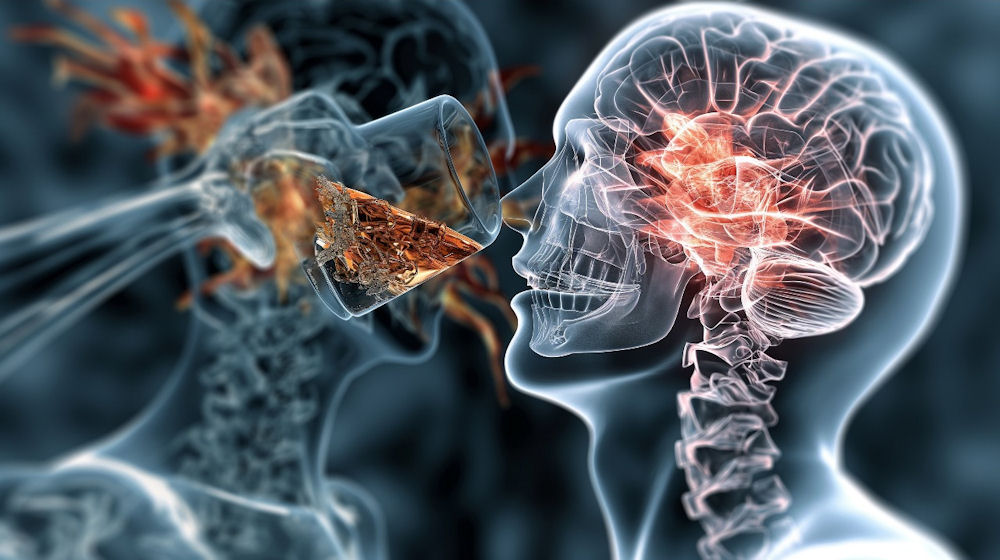
The answer to this question is more complex than a simple yes or no. Drinking leads to serious brain cell defects. But does drinking kill brain cells directly? The straight answer is no. But, the real question isn’t “Does drinking kill brain cells?”, it’s “How does drinking alcohol kill brain cells in the long run?”
Studies on alcohol’s debilitating effects on brain health are well-documented. The details of how it occurs are most important. Knowing these distinctions is key to aiding you and your therapist in charting customized alcohol addiction treatment specific to your needs. Here are all the crucial details you need to know about the link between alcohol abuse and how it affects the brain and body. Does drinking kill brain cells? We break it all down here.
Alcohol has been found to have a severe impact on this region of the hippocampus responsible for memory retention. This is important because deficiencies in this portion of the brain are directly related to a high rate of dementia sufferers. Expositionally speaking, drinking in itself has been directly tied to a severely increased risk of dementia because of the hippocampus’s harm. Correlatively, alcohol-related dementia accounts for up to twenty-four percent of all dementia diagnoses.
Prolonged drinking habits are directly linked to reducing white brain tissue in the subcortical section. Nerve fibers within this deep brain region are vital extensions of these white matter tissue fibers. This alcohol-induced white matter reduction has severe adverse effects on the central nervous system. Therefore, consequent central nervous system defects lead to increased risks of Parkinson’s disease and other long-term nerve deficiencies.
Alcohol is a toxin to the human body, hindering several normal processes. One of these mental harms involves corrupting the limbic system, located in the central cerebellum. This system is directly responsible for mood and specific hormonal regulations. Therefore, alcohol’s destabilizing effects on the limbic system result in drastic mood swings and erratic behavior. These behaviors and shifts in mood will become increasingly irregular and sporadic as drinking persists.
While cognitive impairment has long been connected to alcohol abuse, most are unaware of the extent of these harms. Though drinking is often associated with short-term cognitive decline, it can have long-term consequences. Studies have found that cognitive deficiencies can persist even after the effects of alcohol wear off. Worse yet, permanent cognitive insufficiencies can occur in especially heavy drinkers, resulting in potential loss of license.
Brain cells are vital for memory storage and retention. Considering alcohol disrupts neurobiological processes, prolonged drinking habits damage these storage and retention centers. As a result, researchers have concluded that long-term alcohol use is connected to permanent memory problems. This includes dangerous elevated risks of developing Alzheimer’s disease, among other degenerative brain conditions.
Half of traumatic brain injuries are estimated to result from alcohol abuse. These alcohol induced TBIs transpire for several diverse reasons. Whether from prolonged use, alcohol-induced trips and falls, drunk driving, or other cognitive impacts, studies see a direct correlation. Excessive alcohol consumption can even lead to traumatic brain injuries resulting from overintoxication. If you have experienced any of the aforementioned factors, seek immediate therapeutic assistance today to prevent further harm.
How Does Drinking Kill Brain Cells?
While drinking doesn’t directly kill brain cells, the neurobiological effects lead to eventual cell death. So, how exactly does drinking kill brain cells in the long run? The following alcohol-induced brain defects are subsequent conditions that lead to brain cell damage and death in the long run.

Alcohol is a known cause of long-term brain shrinkage. This occurs due to alcohol’s toxicity to nerve cells and damage to neuroglial blood vessels. As a result, your brain begins to cease development and recede in size. This form of brain cell destruction is especially harmful as your body ages, potentially causing several long-term neurological conditions. These alcohol-induced atrophies give way to elevated irritability, among other mood and cognitive corruptions.
Drinking is a known inhibitor of vital neurotransmitter communication functions. Think of your brain cells as separate voices instructing each other on where to go and what to do. Alcohol silences these voices and distorts them to a degree that inhibits vital brain functions. Over time, these short-term impacts have lasting consequences, accelerating the destruction of vital brain cells in the long term.
When the brain is exposed to alcoholic toxins, it can trigger an inflammatory response that causes cell death. This occurs in cases of binge drinking, allergic reactions, or other neurological damage. This can cause swelling around the affected regions and other serious neurobiological harms. Symptoms of inflammatory brain responses include severe headaches, painful cranial burning sensations, severe disorientation, or redness around the scalp or skull. Seek immediate medical help if you experience any of the aforementioned symptoms.
It may be true that alcohol does not directly kill brain cells. Yet, all of the correlative brain harms are what lead to the killing of brain cells. Aside from the aforementioned factors above, everybody’s mind responds differently to alcohol’s harms. Therefore, brain cell death can occur earlier or later depending on individualized bodily response factors. It’s important to get a complete neurological checkup to assess your brain health and what treatment is needed.
Thiamine is an essential body and neurobiological chemical responsible for cell growth. Excessive alcohol intake inhibits the production of these cells while damaging existing thiamine cells, stunting their cell growth and development. Thus, heavy drinking habits are specifically the direct cause of thiamine deficiency, a condition better known as Wernicke-Korsakoff Syndrome, or WKS. This degenerative condition eventually leads to cellular breakdown and long-term brain cell death.
Drinking, like other substances, has addictive properties that destabilize neurobiological frequencies. This induces a physical and chemical dependency that causes alcoholic cravings and withdrawal symptoms upon cessation. As addiction persists, the mental and physical tolls will eventually cause severe brain defects and permanent damage. Rest assured, our compassionate staff is devoted to helping you restore these neurobiological harms through our unparalleled alcohol addiction programs.
Does Drinking Kill Brain Cells Even in Moderation?
Simply put, like other degrees of drinking habits, no, moderate drinking doesn’t kill brain cells directly. However, there are similar risks of brain damage to those of heavy drinkers, leading to damage at the cellular level. Don’t deceive yourself under the false presumption that you are fine as long as you don’t drink too much. It’s important to know that nobody is exempt from the neurological impacts of alcohol, even if you limit your drinking. While it may not be as severe as heavier drinking habits, you are still susceptible to several neurological defects.
How Long Does It Take For Your Brain to Heal from A Drinking Habit?
Regarding detox, your brain can heal in as little as one to two weeks, depending on addiction severity. This means within that span, detailed detox programs can restore normal neurochemical levels of function and eliminate withdrawal cravings. Health conditions and other brain-related issues are an entirely different matter. While some are completely reversible, other alcohol-caused brain deficiencies may be beyond repair. Nonetheless, stopping now minimizes health condition severity and aids in regaining some degree of neurological improvement and restoration.
How Does Addiction Treatment Heal the Brain?
Our various addiction treatment programs have diverse benefits that aid brain recovery. Here are just a few of the many ways addiction rehab helps heal the brain.
The brain is a complex entity that functions on communicative prioritization. Addiction rehab facilitates healing these cognitive abilities by addressing them directly through personalized training. In turn, your therapist not only treats the underlying addiction but also aids the overall healing process through these training methods.
The primary purpose of addiction treatment is to break the cycles of addiction. The most effective way doctors accomplish that is through instilling new habits and lifestyle changes into your life. For example, exercise routines implemented by your specialist are a great natural way to heal neurobiological imbalances, among other things. Rest assured, your coach will find a lifestyle change or implementation that works specifically to your needs and desires.
Anxiety and stress are common emotions in conjunction with addiction, especially when you first begin treatment. That’s why we provide some of the most state-of-the-art stress management techniquesavailable to accelerate brain recovery.

Alcohol Addiction Treatment at Laguna Shores Recovery
You’ll have the best alcohol rehab specialists and tools at your disposal at Laguna Shores Recovery. We maximize mental and physical healing through a variety of scientific practices centered around neurobiological recovery. These methods help you regain your memory retention capabilities, among other cognitive functions that were hindered by alcohol.
Take the First Step Toward Recovery Today
The first step of the rest of your joyous life begins right here by reaching out to Laguna Shores Recovery in Dana Point, CA. That all-important first step is the biggest, most burden-alleviating hurdle that makes the rest of your recovery that much easier. Connect with us today to begin the first day of the rest of your life in sobriety.

 Matthew Beck B.A, M.A, LMFT
Matthew Beck B.A, M.A, LMFT 


